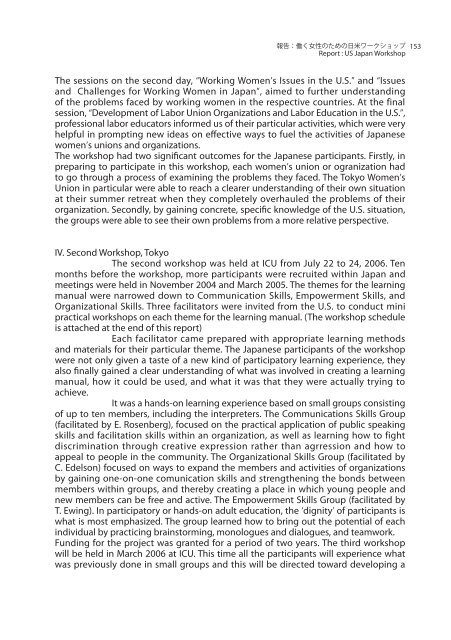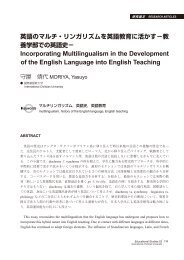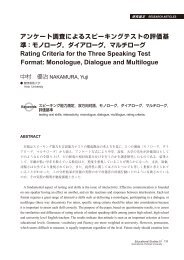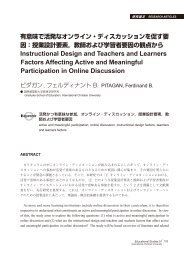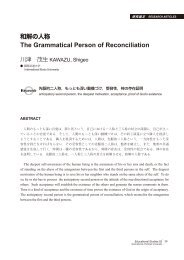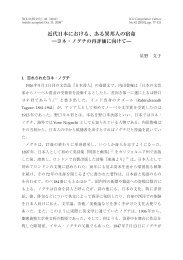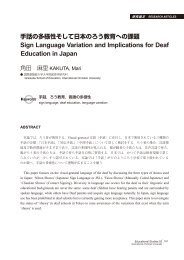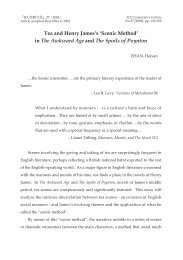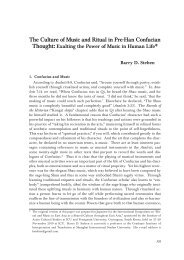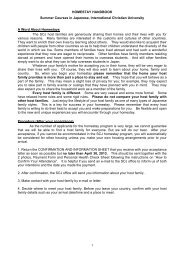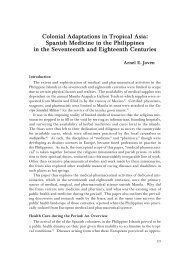Untitled - subsite - å½éåºç£æ大å¦
Untitled - subsite - å½éåºç£æ大å¦
Untitled - subsite - å½éåºç£æ大å¦
Create successful ePaper yourself
Turn your PDF publications into a flip-book with our unique Google optimized e-Paper software.
153<br />
Report : US Japan Workshop<br />
The sessions on the second day, Working Womens Issues in the U.S. and Issues<br />
and Challenges for Working Women in Japan, aimed to further understanding<br />
of the problems faced by working women in the respective countries. At the final<br />
session, Development of Labor Union Organizations and Labor Education in the U.S.,<br />
professional labor educators informed us of their particular activities, which were very<br />
helpful in prompting new ideas on effective ways to fuel the activities of Japanese<br />
womens unions and organizations.<br />
The workshop had two significant outcomes for the Japanese participants. Firstly, in<br />
preparing to participate in this workshop, each womens union or ogranization had<br />
to go through a process of examining the problems they faced. The Tokyo Womens<br />
Union in particular were able to reach a clearer understanding of their own situation<br />
at their summer retreat when they completely overhauled the problems of their<br />
organization. Secondly, by gaining concrete, specific knowledge of the U.S. situation,<br />
the groups were able to see their own problems from a more relative perspective.<br />
IV. Second Workshop, Tokyo<br />
The second workshop was held at ICU from July 22 to 24, 2006. Ten<br />
months before the workshop, more participants were recruited within Japan and<br />
meetings were held in November 2004 and March 2005. The themes for the learning<br />
manual were narrowed down to Communication Skills, Empowerment Skills, and<br />
Organizational Skills. Three facilitators were invited from the U.S. to conduct mini<br />
practical workshops on each theme for the learning manual. (The workshop schedule<br />
is attached at the end of this report)<br />
Each facilitator came prepared with appropriate learning methods<br />
and materials for their particular theme. The Japanese participants of the workshop<br />
were not only given a taste of a new kind of participatory learning experience, they<br />
also finally gained a clear understanding of what was involved in creating a learning<br />
manual, how it could be used, and what it was that they were actually trying to<br />
achieve.<br />
It was a hands-on learning experience based on small groups consisting<br />
of up to ten members, including the interpreters. The Communications Skills Group<br />
(facilitated by E. Rosenberg), focused on the practical application of public speaking<br />
skills and facilitation skills within an organization, as well as learning how to fight<br />
discrimination through creative expression rather than agrression and how to<br />
appeal to people in the community. The Organizational Skills Group (facilitated by<br />
C. Edelson) focused on ways to expand the members and activities of organizations<br />
by gaining one-on-one comunication skills and strengthening the bonds between<br />
members within groups, and thereby creating a place in which young people and<br />
new members can be free and active. The Empowerment Skills Group (facilitated by<br />
T. Ewing). In participatory or hands-on adult education, the dignity of participants is<br />
what is most emphasized. The group learned how to bring out the potential of each<br />
individual by practicing brainstorming, monologues and dialogues, and teamwork.<br />
Funding for the project was granted for a period of two years. The third workshop<br />
will be held in March 2006 at ICU. This time all the participants will experience what<br />
was previously done in small groups and this will be directed toward developing a


